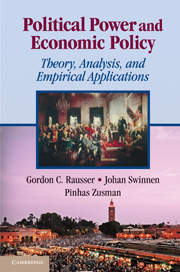Book contents
- Frontmatter
- Contents
- List of Figures
- List of Tables
- Preface
- PART 1 POLITICAL POWER AND ECONOMIC ANALYSIS
- 1 Public Policy: The Lens of Political Economy
- 2 The Nash Solution to the Bargaining Problem
- 3 The Harsanyi Solution to the Bargaining Problem
- 4 Political-Economic Analysis
- 5 Normative Political-Economic Analysis
- 6 Dynamic Political-Economic Analysis
- PART 2 IDEOLOGY, PRESCRIPTION, AND POLITICAL POWER COEFFICIENTS
- PART 3 ANALYSIS OF SPECIFIC STRUCTURES
- PART 4 EMPIRICAL APPLICATIONS OF POLITICAL POWER ESTIMATION
- References
- Index
6 - Dynamic Political-Economic Analysis
Published online by Cambridge University Press: 05 June 2012
- Frontmatter
- Contents
- List of Figures
- List of Tables
- Preface
- PART 1 POLITICAL POWER AND ECONOMIC ANALYSIS
- 1 Public Policy: The Lens of Political Economy
- 2 The Nash Solution to the Bargaining Problem
- 3 The Harsanyi Solution to the Bargaining Problem
- 4 Political-Economic Analysis
- 5 Normative Political-Economic Analysis
- 6 Dynamic Political-Economic Analysis
- PART 2 IDEOLOGY, PRESCRIPTION, AND POLITICAL POWER COEFFICIENTS
- PART 3 ANALYSIS OF SPECIFIC STRUCTURES
- PART 4 EMPIRICAL APPLICATIONS OF POLITICAL POWER ESTIMATION
- References
- Index
Summary
Introduction
The political power theory of endogenous policy formation has focused on the characterization of the political-economic equilibrium. This outcome is the result of a static theory. However, any observed political economy is generated froma systemin transition. Moreover, many meaningful analytic problems are chiefly concerned with the trajectory that a political economy is likely to follow over time, reflecting its dynamic behavioral characteristics.
In various chapters in this book we will be faced with such dynamic effects. For example, in Chapter 15 we evaluate how land reforms and other policies that change the structure of property rights will have long-lasting effects on the power structure. Similarly, in Chapter 18 we analyze the political economy of transition, evaluating how economic policy changes are affected by their implications for power structures, an issue with important dynamic aspects. Political-economic analyses of the choice of policy instruments have also been shown to have important dynamic components, as their choice may be partially determined by their implications for the structure of interest groups in the future, and thus of the dynamic power distribution, as shown by Rausser and Foster (1990) and Acemoglu and Robinson (2001), for example. Finally, an important example of dynamic political-economic effects relates to our analysis of how international agreements such as GATT/WTO may or may not induce sustainable domestic reforms that may depend importantly on the dynamic impact on pro-reform coalitions in the country (see Chapter 14).
- Type
- Chapter
- Information
- Political Power and Economic PolicyTheory, Analysis, and Empirical Applications, pp. 113 - 122Publisher: Cambridge University PressPrint publication year: 2011



